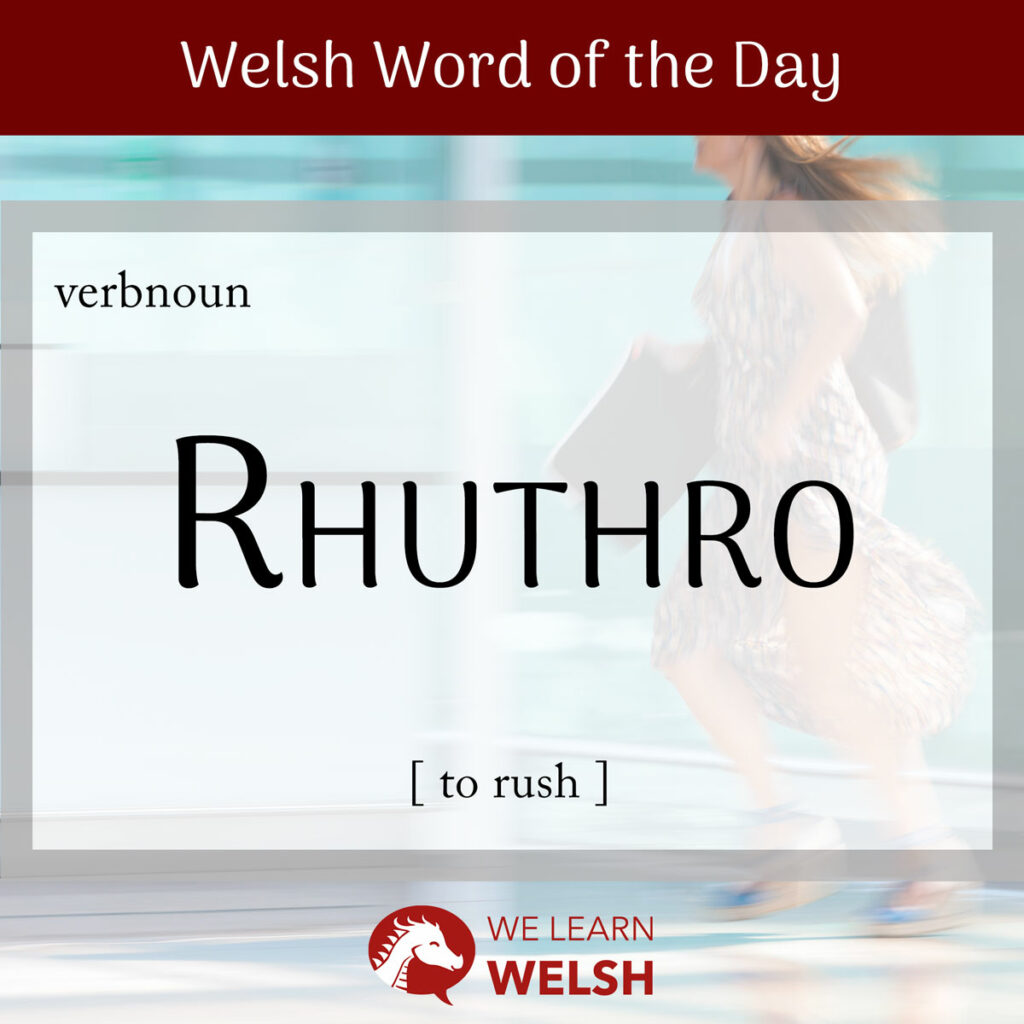Whether it’s on the way to the swyddfa (office), or in a desperate hurry to catch a trên (train), we’ve all been in a situation where we need to rush.
The word rush in English generally conveys two things – that we’re under time pressure to do something, and that we’re moving very fast in order to meet that deadline. If we’re talking specifically about the first of these, the Welsh use brysio (to hurry). However, the word rhuthro, which is probably the best overall translation for rushing or to rush, describes the physical movement.
rhuthro
to rush
Because rhuthro begins with rh, it only responds to one kind of mutation, the soft mutation.
Soft mutation
ruthro
Nasal mutation
N/A
Aspirate mutation
N/A
As you can see, it’s a very subtle change, with the first letter shifting from rh to r. This just means it becomes harder and less breathy, although both of these are still rolled or tapped in all Welsh words.
The other way the word changes is when it conjugates.
| Future | Conditional | Past | |
| First person singular | Rhuthra(f) i I will rush | Rhuthrwn i I would rush | Rhuthrais i I rushed |
| First person plural | Rhuthrwn ni We will rush | Rhuthren ni We would rush | Rhuthron ni We rushed |
| Second person singular / informal | Rhuthri di You will rush | Rhuthret ti You would rush | Rhuthraist ti You rushed |
| Second person plural / formal | Rhuthrwch chi You will rush | Rhuthrech chi You would rush | Rhuthroch chi You rushed |
| Third person singular | Rhuthrith o/e/hi He/she will rush | Rhuthrai fo/fe/hi He/she would rush | Rhuthrodd o/e/hi He/she rushed |
| Third person plural | Rhuthran nhw They will rush | Rhuthren nhw They would rush | Rhuthron nhw They rushed |
Like other verbs in Welsh, the conjugated form isn’t always strictly necessary, as it can be left in the infinitive in many sentences, with other words in the phrase conveying the person and tense.
Like a lot of verbs in Welsh, rhuthro comes from an older noun form. In this case, it’s very intuitively rhuthr (a rush), which we can trace through proto-Celtic *routro all the way back to the proto-Indo-European hreu – also the root of the English word hurry! It’s fascinating how languages, despite their apparent differences, often share more similarities than we realise.
Paid â rhuthro, mae’r palmant yn llithrig!
Don’t rush, the pavement is slippery!
In early Welsh, rhuthr was most often used to mean a sudden attack or charge. Though it’s still used in this sense, sudden attacks are now less relevant to most people’s everyday life! So we most often use rhuthr, and hence rhuthr, to refer to hurrying.
Interestingly, in some parts of Ceredigion, it also carries a second meaning—synonymous with rhuo (roaring). While this might seem unrelated at first, it makes sense when you consider how both rushing and roaring are used to describe the powerful movements of nature, such as the gwynt (wind) and môr (sea).
Here are some simple everyday phrases in which you might use rhuthro or rhuthr:
- rhuthro o gwmpas = to rush about
- rhuthro heibio = to rush past
- ar ruthr gwyllt = in a mad rush
- ar ruthrau = in fits and starts
- ruthro i rywbeth = to rush into something
- dyna ruthro = there was a rush / there is a rush
- rhuthro am rywun = to rush at someone
- dwyn rhuthr = to make an attack
- rhuthro ar eich pen i rywbeth = to run into something
But if these aren’t enough for you, and you’d rather eschew rhuthro in favour of synonyms, Welsh has no shortage of them either! Rhedeg a rasio (running and racing) is often used in the North, to describe running or rushing about. Though plenty of people in the South go for the same, Southerners also have rhedeg a rhwygo, which literally means running and tearing.
Bydd rhaid i ni redeg a rasio er mwyn cyrraedd yr ysgol mewn pryd.
We’ll have to really rush to get to school on time.
Sgrafangu and sgrialu are Northern slang words meaning to hurtle, ffarnu hi means to leg it and is common across the South, and the wonderful gwibyrnellu (to whirl) is a go-to in Glamorganshire. You can even compare yourself to a horse and go for carlamu (to gallop)!
There’s some great idioms conveying the same meaning, too. How about mynd fel cath o dân (going like a cat from fire) or mynd fel cath i gythraul (going like a cat to the devil)? Or if you’re starting to feel sorry for cathod (cats), mynd fel mellten i bren (going like lightning to wood) will do the trick.
Plus, if you just want to get across that you are rhedeg (running) really really fast, you can go with rhedeg nerth eich traed (running with all your feet’s power) or the old reliables gwibio and sbrintio (both meaning sprinting).
Rhuthrodd y môr-grwban bach i’r tonnau i ddechrau nofio.
The baby turtle rushed into the waves to start swimming.
Have you heard any other ways to talk about rhedeg yn gyflym (running fast) or rhuthro in Welsh? Let us know!


